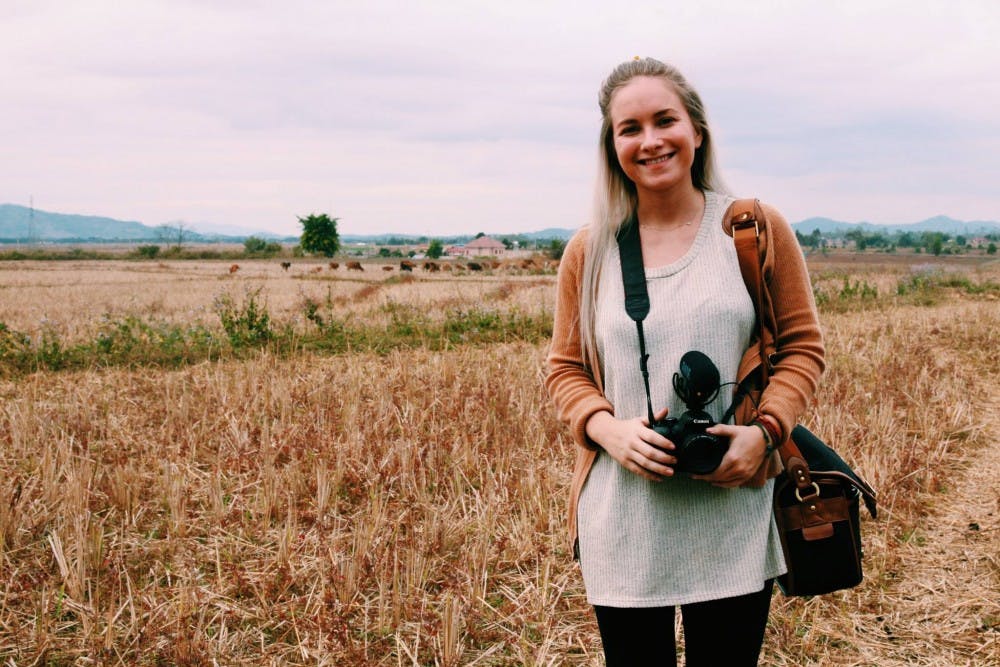Erin McGoff, a senior in the School of Communication, is using her last semester as a film major at AU to create and produce a documentary, “This Little Land of Mines.”
The film addresses the unexploded bombs that the United States dropped on Laos during the Vietnam War, and how they continue to detonate today. McGoff plans to visit Laos for footage after getting funded, and gather interviews from citizens and U.S military officials.
McGoff’s first experience in Laos was when she went there on a family vacation in high school, five years ago. Then, this past winter, she participated in one of AU’s Alternative Break trips to the country for a two week immersive program.
“I was sitting in the library one day, and I saw the Alternative Breaks sheet on Laos, so I applied, and then when I found out the subject of the trip, what it was, I was shocked,” McGoff said. “When I learned that we were going to study how the United States bombed Laos more than any country in the history of warfare...I almost cried.”
The program is designed to inform students of the “secret war” that the U.S. initiated in Laos. This makes it the most heavily bombed country per capita in world history, McGoff said.
Bill Gentile, a filmmaker, journalist, and professor in the School of Communication is McGoff’s supervisor for the documentary. Since he has experience overseas, he plans to help McGoff in her filming of Laos.
“I bring to this project an advisory role on what to anticipate overseas, things to do, things not to do,” he said. “My primary function is to be a sounding board and viewing board. Erin does the heavy lifting.”
Gentile previously traveled to Afghanistan to produce a documentary about the war. He said that he plans to help McGoff maintain the historical focus in her documentary.
“I’m helping her focus on her controlling idea, and what the story is,” Gentile said. “It seems, through our discussions, that the story is about the fact that there are hundreds and thousands of unexploded bombs still laying on the floor of Laos, from the Vietnam War. And they’re not being removed.”
McGoff’s initial perception of Laos has completely changed in recent years. When she visited in high school, she said she loved the way that Laos was untouched from tourism. However, seeing it as a college student on an academic trip was a different experience.
“When I went there, they welcomed me into their homes,” McGoff said “I never even saw a dirty look because I was American, and yet, our country is responsible for so much of their distress and turmoil.”
McGoff said that through this documentary, she wants to educate people on this missing piece of history. As students in the United States, people learn about the Vietnam War, but not about Laos or Cambodia’s involvement, she said.
“Why didn’t I learn about this in high school, or middle school?” McGoff said. “People need to know about this. And I think film is the best way to communicate it.”
To help fund and publicize her project, McGoff began an Indiegogo campaign earlier this year. She had raised roughly $1,800 as of Feb. 22. Her goal is $5,000, yet the film is estimated to cost more than $30,000. She plans to get the rest of the money through grants.
“The farther you go from home, the more this production is going to be,” Gentile said. “Just a matter of logistics. She still has to get there, she has to stay in hotels, get transportation.”
Besides capturing a piece of history that’s been lost, McGoff has a variety of other goals for this documentary.
“I want to engage people actively to help Laos,” McGoff said. “As far as the documentary, I want to show people that girls can be directors, girls can be producers. As far as art goes, I want the film to build a narrative,” she said.
While McGoff is passionate about telling the story of Laos, she has some concerns regarding the reception of the film.
“I don’t want to step on toes. I want to tell a well-rounded story. I already had some military-type people email me and say that I’m telling a one-sided story, which in my trailer, it might seem that way, because I had two minutes,” she said. “But I want to tell the American side. I want to interview some vets and people from the CIA, to see why they did this.”
McGoff said that the relevancy of her film should be a major takeaway for viewers.
“Some people are saying that it’s hard to get people to pay attention to something that happened 40 years ago,” McGoff said. “But, I think today, we might be carpet bombing Yemen. We need to be the watchdogs of our government, because they can get away with bombing a country more than any country in the history of warfare and we won’t know about it. And that blows my mind.”





